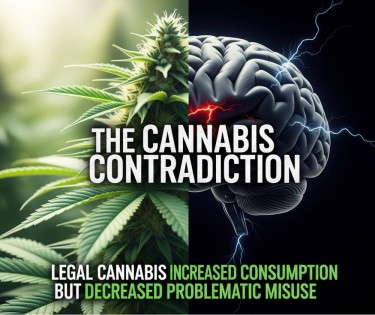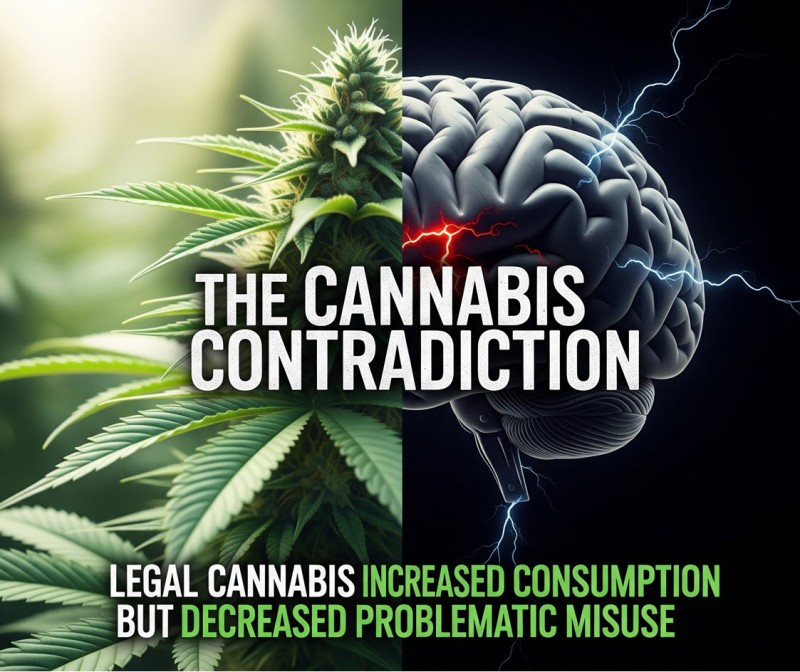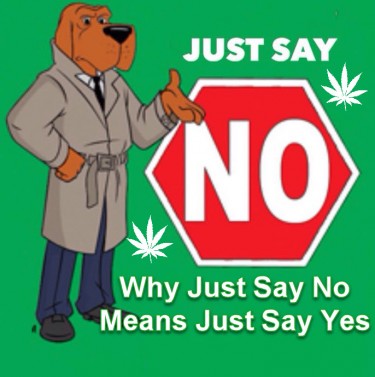
New Study Kills Prohibitionist Myths: Legal Weed Increased Use but DECREASED Problematic Misuse
For decades, we've heard the same tired arguments from cannabis prohibitionists: legalization will trigger a public health disaster, addiction rates will skyrocket, and society will crumble as we know it. These doomsday predictions have been the cornerstone of anti-cannabis rhetoric since the days of "Reefer Madness." Well, folks, the results are in from our neighbors up north, and the prohibitionists have some explaining to do.
A groundbreaking new study published in JAMA Network Open by the American Medical Association (AMA) has delivered a devastating blow to prohibitionist fear-mongering. The research, which tracked 1,428 Canadian adults over five years following nationwide legalization, found that while overall cannabis use increased slightly, problematic misuse actually decreased. You read that right—more people are consuming cannabis, but they're doing it more responsibly.
This shouldn't be surprising to anyone who's been paying attention. When you bring a substance out of the shadows, provide education, quality control, and open dialogue, people tend to develop healthier relationships with it. The Canadian experience demonstrates what cannabis advocates have argued all along: prohibition doesn't prevent use; it prevents safe, informed use.
Let's dive into what this study actually found and what it means for the future of cannabis policy—not just in Canada, but here in the United States and around the world.
What the Study Actually Found
The AMA study tracked Canadian adults aged 18 to 65 from September 2018 (just before legalization) through October 2023, providing one of the most comprehensive looks at post-legalization consumption patterns ever conducted. The results paint a nuanced but ultimately positive picture of legalization's impact.
Overall cannabis use frequency increased by a modest 0.35 percent per year, totaling 1.75 percent over the entire five-year period. This slight uptick is hardly the explosion of use that prohibitionists predicted would follow legalization. Even more telling is what happened with problematic use, which was measured using the Cannabis Use Disorder Identification Test – Revised (CUDIT-R).
The study found "a significant decrease in cannabis misuse overall," with the most dramatic improvements occurring during the early months of the COVID-19 pandemic (April to October 2020). People who were using cannabis weekly before legalization saw their average CUDIT-R scores fall "from above to below the validated CUDIT-R cutoff score of 6 indicating problem cannabis misuse."
In other words, the occasional users who might have been developing unhealthy relationships with cannabis under prohibition actually developed healthier consumption patterns after legalization.
Even more interesting was the breakdown by pre-legalization usage patterns. Those who used cannabis most frequently before legalization (daily users) saw the largest declines in use frequency after legalization. Meanwhile, those who used once a month or less showed slight increases, suggesting a normalization effect where extreme usage patterns (whether very high or none at all) tend to moderate over time in a legal environment.
As the researchers themselves noted, "Fundamentally, however, these results do not suggest increased adverse outcomes for adults who were actively using cannabis before legalization."
The study also found significant shifts in consumption methods, with decreases in smoking flower, concentrates, and tinctures, while edibles, beverages, and vape cartridges gained popularity. This transition toward non-combustible methods represents another public health win, as these consumption methods are generally considered to carry lower health risks than smoking.
The Prohibitionist Fear Factory vs. Reality
For anyone who's followed cannabis policy debates, these findings represent yet another nail in the coffin of prohibitionist arguments. Let's review some of the most common fear-mongering claims and how they've held up:
Claim #1: "Legalization will cause youth use to skyrocket!" Reality: Multiple studies, including several from the CDC, have shown youth cannabis use has actually declined during the legalization era. As the AMA study notes, legal markets with strict ID verification and regulated products may actually be more effective at preventing youth access than the black market, where dealers never check ID.
Claim #2: "We'll see an explosion of addiction and cannabis use disorder!" Reality: The AMA study shows problematic use actually decreased following legalization, particularly among weekly users who saw their risk scores drop below the clinical threshold for cannabis use disorder.
Claim #3: "Legalization sends the wrong message that cannabis is harmless!" Reality: Legal markets actually enable more honest education about both risks and benefits. The shift toward less harmful consumption methods (edibles, vapes) suggests consumers are making more informed choices about reducing potential harms.
Claim #4: "Emergency room visits will increase dramatically!" Reality: While there have been some increases in cannabis-related ER visits in certain jurisdictions, these are often temporary adjustment periods. The Canadian study suggests consumers learn and adapt, with problematic use decreasing over time as norms and education develop.
Claim #5: "Productivity will collapse as everyone becomes a lazy stoner!" Reality: Canada's economy hasn't collapsed. In fact, cannabis has become a significant economic contributor, creating jobs and generating tax revenue. The study found that even daily users moderated their consumption post-legalization, contradicting the image of legalization creating a nation of constant consumers.
Time and again, real-world evidence has debunked these exaggerated claims. Yet prohibitionists continually move the goalposts, finding new potential harms to fixate on whenever their previous predictions fail to materialize.
Why Legalization Actually Reduces Harm
So why does legalization seem to result in more responsible cannabis use? Several key factors come into play:
1. Quality control and consistent dosing: Legal products come with lab testing and consistent potency, allowing consumers to better understand and control their intake. Under prohibition, potency is unknown and wildly variable.
2. Education and open dialogue: Legalization creates space for honest conversations about responsible use, potential risks, and harm reduction strategies. Dispensary staff can provide guidance that black market dealers never could.
3. Reduced stigma around seeking help: When cannabis use is decriminalized, people are more likely to seek help for problematic use without fear of legal consequences or judgment.
4. Social norms and peer regulation: Legal markets develop community standards and norms around responsible use. Think about how our culture views the person who has one beer with dinner versus the person who gets blackout drunk—similar norms develop around cannabis use.
5. Product innovation for harm reduction: Legal markets incentivize the development of products with better safety profiles, such as lower-THC options, balanced THC/CBD formulations, and non-smokable alternatives.
The Canadian experience demonstrates that legalization doesn't just increase access—it creates an entirely different relationship between consumers, the plant, and society. While prohibition pushes use into the shadows where harmful patterns can develop unnoticed, legalization brings it into the light where it can be addressed through education, regulation, and public health approaches.
The Cultural Evolution Takes Time
It's important to acknowledge that the transition from prohibition to a mature, responsible cannabis culture doesn't happen overnight. The Canadian study tracked changes over five years, and even then, researchers noted that some effects were modest in scale. Cultural norms take time to develop, and educational efforts require consistent reinforcement.
When alcohol prohibition ended in 1933, America didn't immediately develop a healthy relationship with alcohol. It took decades of public health campaigns, evolving social norms, and regulatory adjustments to create today's more moderate drinking culture (which is still far from perfect). We should expect a similar evolution with cannabis.
The good news is that we're already seeing this evolution happen faster than it did with alcohol. The Canadian study shows that even within five years, consumption patterns shifted toward more moderate, less problematic use. As legalization continues and matures, we can expect these positive trends to strengthen.
Future generations will indeed likely view cannabis similarly to how they view alcohol—a substance that carries both potential benefits and risks, to be used responsibly by adults. There will always be some individuals who develop problematic relationships with cannabis, just as some do with alcohol, gambling, or even food. The question is whether legalization helps minimize those harms compared to prohibition—and the evidence increasingly suggests it does.
The Economic Opportunity We're Missing
While the health and social benefits of legalization are compelling, we shouldn't overlook the economic dimension. Canada has created a thriving cannabis industry that generates billions in revenue and supports thousands of jobs. In 2023 alone, legal cannabis sales in Canada exceeded $4.3 billion.
This echoes what Popular Mechanics predicted back in 1938 when they called hemp a "billion-dollar crop." Today, when adjusted for inflation, that would be a multi-billion-dollar industry—and that prediction was made before anyone contemplated a legal recreational market.
The economic potential goes far beyond just retail sales. Cannabis legalization creates jobs across multiple sectors: agriculture, manufacturing, retail, technology, security, transportation, marketing, legal services, and more. In mature legal states like Colorado and California, the cannabis industry has become a significant economic driver and tax revenue generator.
Meanwhile, states that maintain prohibition continue to waste resources on enforcement while missing out on this economic opportunity. The question isn't whether cannabis will be consumed—the data shows it will be, regardless of legal status. The question is whether we'll continue to criminalize it, forgoing tax revenue and job creation while perpetuating the harms of prohibition.
The Sticky Bottom Line
The AMA study from Canada provides the clearest evidence yet that legalization's benefits extend beyond just economic gains and criminal justice reform. By creating conditions for more informed, responsible use, legalization appears to actually reduce problematic cannabis consumption while allowing adults the freedom to make their own choices.
This shouldn't be surprising. When we treat adults like adults—providing them with accurate information, quality-controlled products, and the agency to make their own decisions—most people tend to make responsible choices. The minority who develop problems are better served by health resources than handcuffs.
The prohibitionists' doomsday predictions have failed to materialize, both in Canada and in U.S. states that have legalized. Youth use hasn't skyrocketed, addiction rates haven't exploded, and society hasn't crumbled. Instead, we've seen economic benefits, criminal justice improvements, and now evidence of public health gains through reduced problematic use.
As more jurisdictions consider cannabis reform, this growing body of evidence should inform the conversation. The question isn't whether legalization has risks—every policy choice does. The question is whether those risks outweigh the demonstrated harms of prohibition. Increasingly, the data suggests they don't.
The journey from prohibition to a mature, responsible cannabis culture isn't without challenges. There will be adjustments, lessons learned, and policies refined along the way. But the Canadian experience shows that we're on the right track—and that the prohibitionists' fear factory has been manufacturing myths, not facts.
In the end, cannabis legalization isn't about creating a perfect world. It's about creating a better one than prohibition gave us. By that measure, the evidence continues to mount that it's succeeding.






